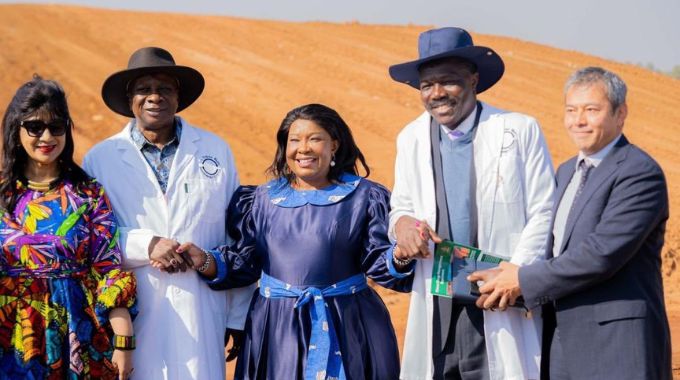Blessings Chidakwa
SADC countries have showered praises on Zimbabwe for the milestones it has achieved through implementing environment-friendly projects under Geo Pomona Waste Management, with the regional bloc honouring the First Lady Dr Auxillia Mnangagwa by appointing her its Environment Patron.
Yesterday, Zimbabwe hosted this year’s Regional World Environment Day commemorations which were fully subscribed with delegates from the United Nations, SADC and members of the diplomatic corp, among several other dignitaries.
The vote of confidence bestowed on Zimbabwe through the SADC honour on First Lady Dr Mnangagwa is a step in the right direction as the country prepares to host the SADC summit this August.
The World Environment Day celebrations held at Geo Pomona Waste Management site in Harare, started with Amai Mnangagwa planting a munondo tree before touring the facility which she described as breathtaking.
Among the facilities toured were the sorting plant for waste separation either for reducing it, reusing or recycling, wastewater treatment plants, weighbridge, concrete mixer and the modern sporting facilities.
Dr Mnangagwa, impressed by the new look Geo Pomona Waste Management then suggested that a training school for waste management be established as Zimbabwe takes issues of the environment seriously.
From a once smelly dumpsite to a relaxing public park, this is the alluring tale of the new look Geo Pomona Waste Management, courtesy of the Second Republic.
The former Pomona dumpsite used to be ravaged by fires every year, heavily polluting surrounding residential areas like Pomona and Mount Pleasant where cases of respiratory ailments, diarrhoea and dengue fever were reported.
It used to teem with flies, maggots and rummaging dogs, all thriving on the slimy and decaying garbage.
On a “good day”, surrounding residential areas were treated to waves of nauseating odour and in the worst case, they could go for weeks on end blanketed in thick oily smoke from burning litter.
Things have changed for the better through President Mnangagwa’s visionary leadership and support.
While addressing guests, First Lady Dr Mnangagwa said she was humbled by the recognition from SADC to be its patron for the environment.
“As a country, we are pleased that Zimbabwe was selected for the commemorations of the World Environment Day.
“This comes at a time when we will be hosting the SADC summit in August of this year,” she said.
“We are determined to join the SADC nations and others to a prosperous planet earth in which people live healthy lifestyles and clean environments. I thank you for the honour bestowed on me to be the patron of SADC and the Government thank you so much,” she said.
Dr Mnangagwa said the celebrations at Geo Pomona Waste Management site were befitting considering this year’s World Environment Day theme which is, “Land restoration, desertification and drought resilience”.
“This new modern waste management ecosystem is a true testimony of what we can do collectively to conserve our environment.”
The newly appointed SADC Patron for Environment said the World Environment Day, held annually on June 5, was a crucial reminder of the environment’s critical role in our well-being.
“It fosters global awareness and action for environmental protection. Since its inception in 1972, it has grown into a platform for public outreach and is celebrated in many countries.
“This commemoration underscores the importance of community involvement in addressing environmental issues,” she said.
Dr Mnangagwa said the United Nations decade on eco-restoration (2021-2030) aligned perfectly with this year’s theme which aims to prevent, halt, and reverse ecosystem degradation – a crucial step in combating climate change, ending poverty, and achieving sustainable development goals.
“We are happy that the United Nations family selected Zimbabwe and we move towards our Vision 2030, of an upper middle-income target is possible through caring for our environment,” she said.
The First Lady said environmental problems were often a result of people’s neglect of their surrounding environment.
“The littering by individuals and companies of liquid and solid waste is a source of environmental pollution.
“Many preventable diseases emerge from the human environment, of which ambient air and water pollution are catalysts of various diseases. The diseases have been pervasive, originating from homes, businesses and community areas, creating an unhealthy environment for citizens and putting children in vulnerable situations,” she said.
Amai Mnangagwa said the restoration of wastelands or dumpsites was necessary, as these can be turned into productive and aesthetic landscapes.
She said healthy ecosystems were vital for a healthy planet and its inhabitants.
“These ecosystems purify our temperatures, and air provides water, regulates recreational opportunities and offers habitats for diverse wildlife.
“However, unchecked urbanisation and unsustainable practices threaten these vital resources and their functions. Restoring urban ecosystems requires awareness and action from citizens and policymakers,” said the First Lady.
Dr Mnangagwa said green spaces must be prioritised when planning and collaborating with communities and authorities.
“Initiatives like cleaning waterways, planting trees, and creating urban wildlife habitats can significantly contribute to the ultimate sustainable cities and communities as advocated through Sustainable Development Goal (SDG) 11.
“In Zimbabwe, the Clean Green Initiatives (CGI) offers opportunities for communities to partner with the private sector to restore healthy ecosystems. However, progress cannot be made without addressing the plastic menace,” she said.
The First Lady said plastic pollution posed a significant global and local threat.
“Every year, large quantities of plastic waste pollute our land and water bodies impacting negatively on ecosystems and wildlife. In Zimbabwe, very little of the waste is recycled, and plastic waste constitutes a significant portion.
“If plastics end up in our environment and are uncollected, they clog our rivers, wetlands, cropland and grazing areas,” she said.
Dr Mnangagwa said the Zimbabwe Government was committed to addressing plastic pollution by implementing the Extended Producer Responsibility (EPR), which encouraged producers to take responsibility for the entire lifecycle of their products.
This promoted a circular economy focused on the removal of plastics and the introduction of paper shopping baskets or bags.
“There is a need for public-private partnerships for the handling of waste. This facility will generate several products while ensuring that waste is turned into a resource.
“I hope we all adopt a regional approach to save our environment, people and biodiversity. The negative consequences of environmental degradation are many. They rob our children of a better desirable future. Our communities are affected when climate change hits, with food and water shortages,” she said.
Geo Pomona Waste Management Private Limited chief executive officer and executive chairman Dr Dilesh Nguwaya said the firm would remain at the centre of spearheading sustainable waste management in Zimbabwe.
“Where you are seated today was once a vast and unmanaged dumpsite which posed serious environmental and health hazards to the entire city of Harare.
“However, since the takeover of the waste management site in April 2022, our company has led a tremendous environmental management revolution which gives value to why we are all gathered here today,” he said.
United Nations’ (UN) Resident and Humanitarian Coordinator Mr Edward Kallon reaffirmed the UN’s commitment to ensuring environmental sustainability and climate action across the world.
“Madam First Lady and partners, the United Nations remains committed to adapting and ensuring environmental sustainability for current and future generations,” he said.
SADC’s secretariat’s senior programme officer environment and climate change, Ms Sibongile Mavimbela, said the regional bloc was taking action to mitigate the effects of climate change currently being experienced in the region.
“The Southern African region is grappling with El Nino-induced below-average rainfall exacerbating existing drought conditions and amplifying the effects of land degradation in Southern Africa,” she said.
Acting Minister of Environment, Climate and Wildlife Mangaliso Ndlovu said the Second Republic was putting shoulder to the wheel in preserving the country’s environment and that of the world at large.
“Zimbabwe is committed to playing its role in addressing multiple environmental crises for the greater good of the world and our country,” he said.
Harare Minister of State for Provincial Affairs and Devolution Charles Tawengwa said was a need to do more to preserve the country’s diverse flora and fauna.
“Emphasis is on the need to jealously safeguard the richness and diversity of life, the delicate ecosystems and the intricate symbolic synergies between fauna and flora. The finite and invaluable indispensable resources need our care,” he said. – Herald

